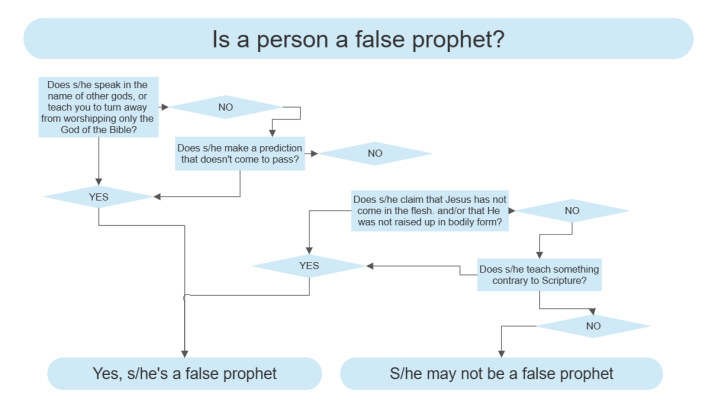Click here for the reading schedule for 2023 to see today’s reading, with links to the text and video of the reading.
To see my past posts on today’s reading or anything else, see the right-hand margin or click here.
In Matt. 7, as part of the Sermon on the Mount, Jesus warns against false prophets, telling believers to examine the fruit (i.e., actions) of claimed prophets, because that will show whether they are true or false prophets. Because of this, LDSs will claim that JS should be considered a true prophet because of [fill in the blank with some good thing he did]. However, I have to point out that this section on examining a claimed prophet’s “fruit” is sandwiched between two sections that indicate that it is possible for someone to appear to be one thing on the outside or at a surface level, but to be something else on the inside: calling false prophets “wolves in sheep’s clothing”, and saying, “Not everyone who says to me, ‘Lord, Lord,’ will enter the kingdom of heaven.” That is, false prophets can appear to be sheep — a cursory examination may not show their true colors — and some who claim to be believers give lip service only but do not truly follow Christ.
Recently, I heard just this sort of claim from a Baptist pastor turned LDS, and he said that what changed his mind about JS, from thinking he was a fraud to thinking he was a true prophet, was things like 1) JS forgiving Orson Hyde and W.W. Phelps for having sworn out affidavits against him, 2) JS giving up his home when he was sick with malaria for others who were also sick, and 3) JS leaving the Mormons to go to jail (where he was ultimately killed), rather than staying and fighting, which would have ended with many Mormons dying. While I will grant that all of these actions were apparently good and noble, at least from the outside, is that the sort of “fruit” Jesus was saying shows whether a person is a false prophet or a true prophet?
Here’s one problem: I daresay that many a religious leader has acted in similar ways towards their friends and loyal followers. If we must accept JS as a true prophet because he was occasionally nice, mustn’t we also accept Mohammed or any other religious leader who wasn’t horrible all the time? Also, how can we distinguish between a “wolf in sheep’s clothing” and an actual “sheep”? It must be a more thorough examination than simply, “here are some good things he did”, since we could say that those “good things” are just the “sheep’s clothing”.
I propose that a more thorough examination is necessary and is what Jesus intended. After all, the OT gives good Tests of a true and a false prophet, and I cannot imagine that Jesus would ever say that we should throw those out and ignore them. Indeed, with as many times as He hearkened back to the OT Scriptures with, “Have you not read…?”, I don’t think it’s too much of a stretch to say that this was at least part of what He intended His listeners to understand when He talked about knowing a false prophet by his (or her) fruit.
With that in mind, here’s a flow-chart I did using Biblical tests to distinguish true from false prophets.

Note that “nice to his friends” is nowhere on the list. Indeed, Jesus pointed out earlier in the Sermon on the Mount that “even the publicans”, who were typically considered horrid sinners and traitors of their nation, were nice to their friends and brethren. That said, I think we could all agree that being kind and being nice to your friends would be a necessary aspect of being a true prophet; however, I think most of us would also agree that it is not sufficient in and of itself to mark out a true prophet. I surely would hope that even that former-Baptist-now-LDS would agree that an otherwise nice person who worshipped Zeus and/or claimed to speak for him could not be a true prophet, since he didn’t worship and serve God alone. That rotten fruit alone is enough, Biblically speaking, to mark a person as a false prophet. But LDSs don’t like being reminded of the next Biblical criterion showing a false prophet: foretelling something that does not come true. This is because of the many False Prophecies of Joseph Smith. Instead of just accepting the Bible as it stands, they begin to hem and haw and cavil.
As far as I know, JS did not violate the 3rd criterion in my flow-chart above, but he violated the first, second, and last, in that he also taught many things contrary to Scripture. Any one of them would be sufficient “fruit” to mark him as a false prophet and avoid him, no matter how nice he was to some of his friends some of the time. Sadly this Baptist pastor didn’t know his Bible well enough to do the same.
See also my past posts on false prophets / false prophecies here:
- What to do with false prophets?
- Jesus a False Prophet?
- Another reason to think prophets are not for this day
- Why Nineveh doesn’t save Joseph Smith (see also False Prophecies of Joseph Smith in Sept. 2022)
- What *would* qualify as a prophet leading the church astray?
- The LDS Church’s past and present “prophets”
2 thoughts on ““Ye shall know them by their fruits…””